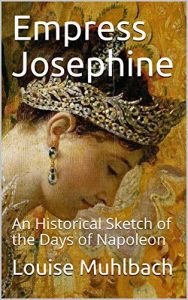“I win the battles, Josephine wins me the hearts.” These words of
Napoleon are the most beautiful epitaph of the Empress Josephine, the
much-loved, the much-regretted, and the much-slandered one. Even while
Napoleon won battles, while with lofty pride he placed his foot on the
neck of the conquered, took away from princes their crowns, and from
nations their liberty--while Europe trembling bowed before him, and
despite her admiration cursed him--while hatred heaved up the hearts of
all nations against him--even then none could refuse admiration to the
tender, lovely woman who, with the gracious smile of goodness, walked
at his side; none could refuse love to the wife of the conqueror, whose
countenance of brass received light and lustre from the beautiful eyes
of Josephine, as Memnon’s statue from the rays of the sun.
She was not beautiful according to those high and exalted rules of
beauty which we admire in the statues of the gods of old, but her whole
being was surrounded with such a charm, goodness, and grace, that the
rules of beauty were forgotten. Josephine’s beauty was believed in,
and the heart was ravished by the spell of such a gracious, womanly
apparition. Goethe’s words, which the Princess Eleonore utters in
reference to Antonio, were not applicable to Josephine:
“All the gods have with one consent brought gifts to his cradle, but,
alas! the Graces have remained absent, and where the gifts of these
lovely ones fail, though much was given and much received, yet on such a
bosom is no resting-place.”
Napoleon are the most beautiful epitaph of the Empress Josephine, the
much-loved, the much-regretted, and the much-slandered one. Even while
Napoleon won battles, while with lofty pride he placed his foot on the
neck of the conquered, took away from princes their crowns, and from
nations their liberty--while Europe trembling bowed before him, and
despite her admiration cursed him--while hatred heaved up the hearts of
all nations against him--even then none could refuse admiration to the
tender, lovely woman who, with the gracious smile of goodness, walked
at his side; none could refuse love to the wife of the conqueror, whose
countenance of brass received light and lustre from the beautiful eyes
of Josephine, as Memnon’s statue from the rays of the sun.
She was not beautiful according to those high and exalted rules of
beauty which we admire in the statues of the gods of old, but her whole
being was surrounded with such a charm, goodness, and grace, that the
rules of beauty were forgotten. Josephine’s beauty was believed in,
and the heart was ravished by the spell of such a gracious, womanly
apparition. Goethe’s words, which the Princess Eleonore utters in
reference to Antonio, were not applicable to Josephine:
“All the gods have with one consent brought gifts to his cradle, but,
alas! the Graces have remained absent, and where the gifts of these
lovely ones fail, though much was given and much received, yet on such a
bosom is no resting-place.”












